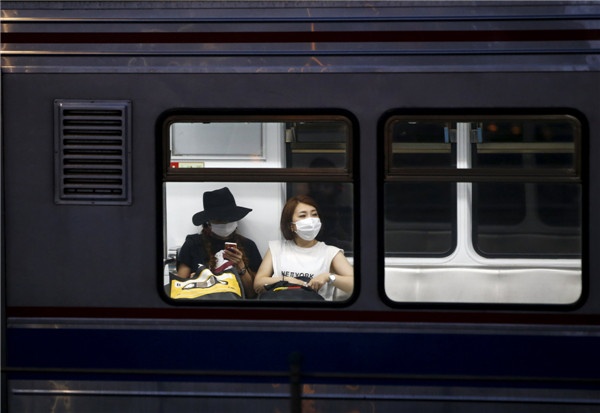GOVT RESPONSE, UNIQUE HOSPITAL CULTURE
 |
|
Women wearing masks to prevent contracting Middle East Respiratory Syndrome (MERS) ride a subway train in Seoul, South Korea, June 12, 2015. [Photo/Agencies] |
The unusually rapid spread of the MERS virus in South Korea was attributed to the bungling of the government's initial response and the country's unique culture at hospitals.
As President Park Geun-hye pointed out, the government failed to make an exact judgment on the outbreak and to actively respond to the contagion in an initial stage.
"The first reason (for the government's failure of initial response) is an asymmetry in (MERS) information," said Dr. Lee. He noted that unnecessary rumors and other chaotic situations appeared as the government failed to judge whether the outbreak was a state of crisis or not.
Based on the judgment, the government should have rapidly disclosed information on the MERS in a transparent manner, the co- head of the joint mission said. South Korea belatedly unveiled the list of hospitals, which infectees checked into and visited in the past, while asking cooperation from municipal governments belatedly.
Lee said that governance had not been established here to contain the viral disease spread, noting that resources of the municipal governments failed to be mobilized in the initial stage due to lack of judgment.
MERS contagions were unexpected and unfamiliar to doctors as well, Fukuda said, as they failed to diagnose the patients, who showed symptoms of respiratory illnesses, with the MERS due to lack of experiences.
Overcrowding emergency wards and multi-bed rooms at hospitals blocked the infection control and prevention from being optimized here, Fukuda said. The culture of accompanying many friends and families at hospitals had contributed to the second spread of infection, he said.
The practice of "doctor shopping" also served to boost the rapid spread, Fukuda said, as patients should first visit small clinics to get referrals to biggest hospitals, in which most of patients want to be treated. The virus possibly spread at a fast pace in the country while patients wandered around to seek bigger hospitals.